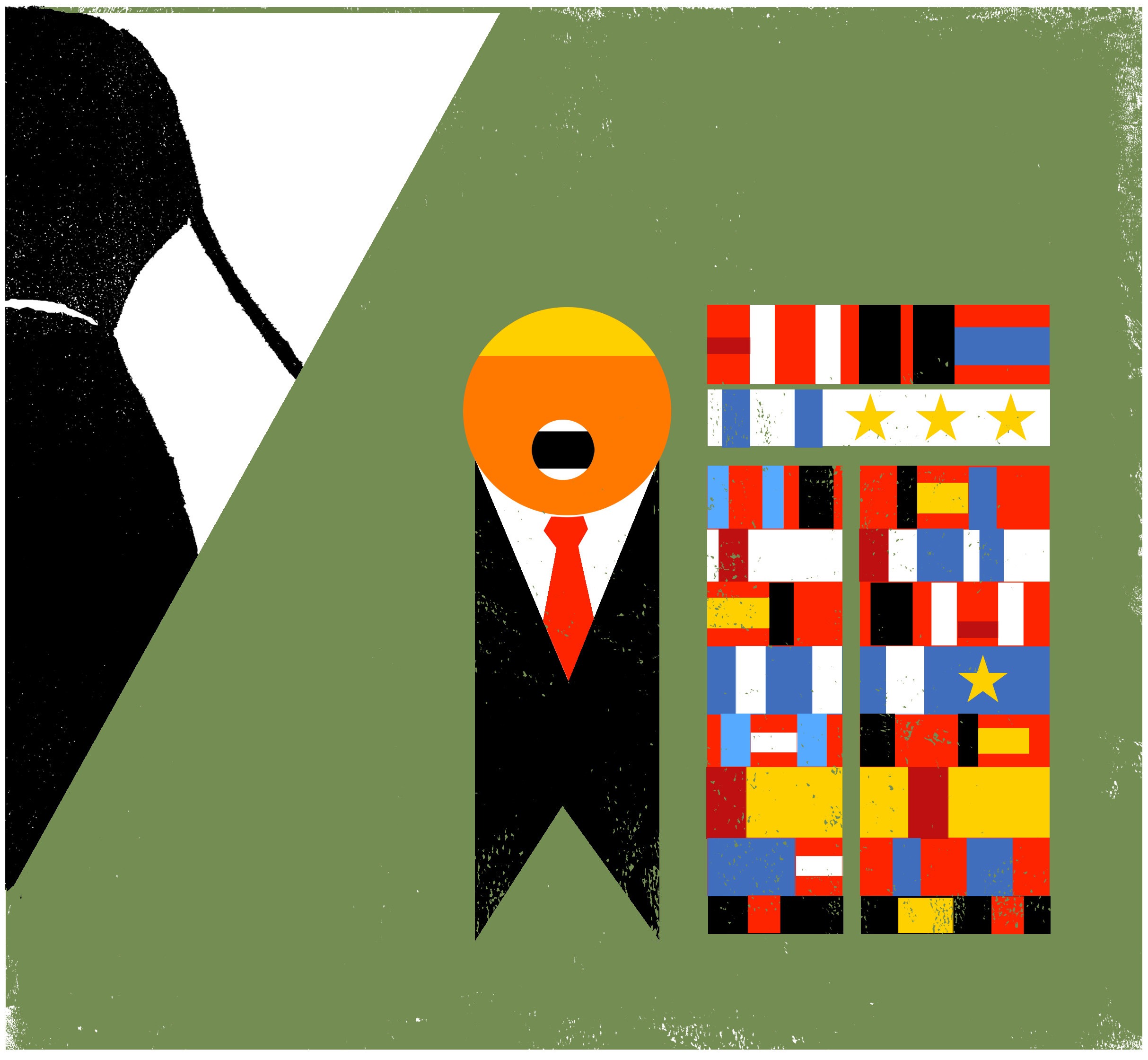In an April 27 article for The Washington Spectator, “All Enemies Foreign and Domestic,” I set out to trace the enduring influence of conspiracy theories that took root among military officers on the far right after the disaster in Vietnam, then morphed into present-day extremist and paramilitary movements, and inspired many of those who led the failed Capitol insurrection on January 6.
It’s easy, and entirely justified, to denounce congressional Republicans for blocking an independent bipartisan investigation into those events. Who incited whom to do what and when? What did they do on the day of the attack? What degree of shared belief and active collusion was there between elected Republican officials, QAnon conspiracy theorists, and the cutting edge of the assault—the organized groups of military veterans like the Oath Keepers, who led the disciplined “stack” that led the charge up the Capitol steps? The role of these groups, and the degree of far-right and white supremacist activity within the military, would have been a central focus of any investigation, and is already a priority for the Defense Department.
But if the commission had been limited to the events of January 6, it would have missed much of the point. The biggest risk here is not that we fail to understand what happened in the past and breathe a sigh of relief that American democracy dodged a bullet. It’s that we don’t recognize what some have called a process of “ongoing incitement.” The main significance of January 6 is that it failed. But failure is a learning experience, and those who propelled the insurrection are determined not to fail again. In that sense, the storming of the Capitol was not a culmination: it was one event in a sequence, even a dress rehearsal, just as the invasion of the Michigan State Capitol by armed militants last April can be seen as a dry run for January 6.
When Republicans in Congress twice opposed the impeachment of Donald Trump, they gave reasons that were at least superficially plausible. But their excuses this time are either laughable—like Mitch McConnell’s argument that a commission with subpoena powers wouldn’t find anything that won’t be uncovered by ongoing criminal proceedings—or transparently self-protective, like the assertion by Senator John Thune of South Dakota that the commission’s findings would be politically weaponized before the 2022 midterm elections. So by all means call them cynics, hypocrites, and, above all, cowards. But that is also how the increasingly powerful forces on the far right that have seized control of much of the Republican Party see them—their cowardice being their refusal to overturn the results of the election.
The gutting and takeover of the party has progressed in plain sight since January 6, embodied in the state-level drive to curtail voting rights and driven by the zeal of the two-thirds of Republican voters who have embraced Trump’s Big Lie of a stolen election. The advance of the “cutting edge”—the military veterans of the Vietnam era and their present-day acolytes, however, has been less visible, though no less real. Perhaps the most important, though scantly reported, manifestation of this has been the emergence of a new group of retired officers called Flag Officers 4 America—“flag officers” meaning generals and admirals.
The origins of the group go back to 2015. As I wrote in April, the leading post-Vietnam conspiracy theorists came from units that considered themselves the military elite, like the Special Forces, the fighter pilots, and the airborne divisions. One such officer was retired Maj. Gen. Sid Schachnow, who had led a 12-man team of Green Berets on the Cambodian border, later moved on to the 101st Airborne, and eventually became commander of the U.S. Special Forces Command. Schachnow organized a letter, signed by 88 retired flag officers, in support of Trump’s candidacy. Although it was strongly worded, the issues they focused on were the kind you might conventionally expect from military conservatives: unacceptable cuts in the military budget; insecure borders; and the threat from foreign adversaries, especially radical Islamists.
There’s nothing inherently unusual about retired military officers and national security officials endorsing a presidential candidate—more than 500 did so for Joe Biden. But Schachnow’s initiative morphed into something entirely different. By the time the 2020 election came around, Schachnow himself had died, and the baton was passed to retired Army Maj. Gen. Joe Arbuckle, who organized another open letter endorsing Trump’s reelection. The list of signatories had swelled from 88 to 317, and the language was sweeping and apocalyptic: “As senior leaders of America’s military, we took an oath to defend the United States from all enemies, foreign and domestic. . . . [T]his is the most important election since our country was founded. With the Democratic Party welcoming to socialists and Marxists, our historic way of life is at stake.” Steve Bannon, on his War Room show, praised the letter as “a called shot.”
Arbuckle waited until the end of Biden’s first 100 days in office before issuing his next broadside and formally launching the new organization, Flag Officers 4 America. All of his worst fears had been realized, he told Bannon. “We’re speeding, running down the road to socialism and Marxism.”
The new letter, issued on May 10, opened with the Big Lie that the election had been stolen and the theft ignored by the FBI and the Supreme Court. “Without fair and honest elections that accurately reflect ‘the will of the people’ our Constitutional Republic is lost,” it read. “H.R.1 and S.1 (if passed) would destroy election fairness and allow Democrats to forever remain in power.”
The list of signatories this time contained many familiar names. They included two of the principal figures in the Iran-Contra scandal during the Reagan administration: former national security adviser Vice-Admiral John Poindexter and retired Air Force Maj. Gen. Richard Secord, former head of clandestine air operations in Southeast Asia (the Vietnam-era Air Force is in fact disproportionately represented, especially among the higher ranks of three-star generals in the group). There are two of the best-known fringe conspiracy theorists, both of that same rank, Lt. Gens. William “Jerry” Boykin, executive vice president of the Family Research Council and a member of the Council for National Policy, and Thomas McInerney, who told One America News that Trump should have invoked the Insurrection Act and declared a state of emergency to prevent Biden’s theft of the election. There are also present-day elected officials and aspirants, such as retired Brig. Gen. Don Bolduc, who plans to run for the Senate in New Hampshire in 2022 (and already has the endorsements of Boykin, as well as Senator Tom Cotton of Arkansas), and Trump’s former chief medical adviser, Rear Adm. Ronny Jackson, who was forced from his post after allegations of misconduct but then went on to win a landslide victory in Texas’s 13th congressional district last November, and has vowed that “every Deep State traitor deserves to be brought to justice for their heinous actions.”
While the language of the May 10 letter was unprecedented for a group of former military officers, there was still another shoe to drop, which took the Flag Officers 4 America deeper into uncharted territory by allying them explicitly with the far-right effort to take control of the Republican Party at the grassroots level. On June 1, the group issued a Citizen’s Action Plan for America, “to put constitutional government back in the hands of ‘We the People.’” The laundry list of actions focuses on elections, education, law enforcement and organizing “within church groups, among church groups, and outside church groups.” It urges supporters to volunteer as poll workers and watchers and to work for the election of “those with traditional values” at all levels of the party apparatus: county commissioners and county clerks; mayors and city council members; and party precinct officers, as well as “electing sheriffs and DA’s who will constitutionally enforce the rule of law and will resist state and federal mandates infringing on Constitutional Rights of citizens.” In the educational sphere, it demands that parents wrest power away from school boards and teachers’ unions to “remove critical race theory and 1619 project teaching” and “insist on fact-based teaching of climate change and our national history.”
As Arbuckle’s long interview with Steve Bannon progressed, the underlying logic of the flag officers’ argument became clearer and more chilling. The foundational principle of the American armed forces is that they are obedient to the elected commander-in-chief and civilian authority. But what if the election was stolen, and the commander-in-chief is illegitimate? Soldiers are then left with two options: to accept this or to resign. Furthermore, Arbuckle went on, “cultural Marxism” was now eating away at the military itself, symbolized by the appointment of Bishop Garrison, an African American former human rights advocate, as senior adviser to the secretary of defense for diversity, equity, and inclusion.
“You’re the tip of the spear,” Bannon told Arbuckle, wrapping up the interview. “And we’re a platform and an apparatus for you heroes and patriots.”
Left unspoken was the third option: neither accept nor resign but disobey and resist. Some radical veterans will say this openly. “If you vote your way into socialism,” says one former Special Forces officer in a recently formed paramilitary group, “you have to shoot your way out.”
This new organization, 1st Amendment Praetorian, represents a further stage in the continuing evolution of veteran-centered far-right groups. It has much in common with the Oath Keepers—the invocation of the 1968 Tet Offensive in Vietnam as the starting-point of the global anti-American conspiracy incarnated in the Democratic Party and the Deep State, the vow to defend the Constitution “against all enemies foreign and domestic,” and the special role of elite units of the military. The group’s leader, Robert Patrick Lewis, a combat veteran of Iraq and Afghanistan, says that the group was founded last October and provided security and intelligence, including the high-tech surveillance of protesters, to a string of Stop the Steal, MAGA, and other “patriot” rallies in the weeks following the election. By January, it had organized a security detachment for retired Lt. Gen. Michael Flynn—who helped raise funds for the group—and Trump’s lawyer Sidney Powell. It performed this function at a Memorial Day weekend rally in Dallas where Flynn mooted the idea of a Myanmar-style military coup in the United States. What comes next, according to the group’s website, is a “Coalition to Defend America” event in Palm Beach, Florida, on July 4 and the formation, together with “constitutional sheriffs,” of grassroots “resilience groups, training them to free the oppressed.”
Like the Oath Keepers and the Three Percenters, 1st Amendment Praetorian is wedded to the idea that small numbers of highly trained individuals can move mountains. The key, Lewis says, is the unique organizational structure of the Special Forces, the 12-man Operational Detachment Alpha, which is “trained and equipped and operates under the knowledge that one ODA of 12 Green Berets can take down an entire nation.”
Outside of Bannon’s War Room and the other usual suspects—Breitbart, Sean Hannity, Glenn Beck, and the Epoch Times, the Falun Gong–affiliated paper that serves as an increasingly influential platform for extreme right-wing misinformation, the May letter from the Flag Officers 4 America attracted little media attention, and the Citizen’s Action Plan, despite its more far-reaching implications, got none. A May 11 piece in Politico—the only substantial reporting on the letter—elicited a few pro forma comments from experts on civilian-military relations and other military officers, both active and retired: “disturbing and reckless” . . . “outrageous” . . . “shocking” . . . “an appalling breach of military professionalism.” But that was it.
Extremism in the military, and among veterans, would obviously have been a central focus of a January 6 commission. But its terms of reference would have reached none of this ongoing convergence between the base of the Republican Party, the most extreme conspiracy theorists, and those prepared to use violence to ward off what this constantly metastasizing far-right movement sees as an existential threat to the survival of the nation.
But voting on a commission is not the only way for elected officials to make their voices heard. Ninety-one veterans currently serve in Congress: 63 Republicans and 28 Democrats. Of the 53 Republican vets in the House of Representatives, five voted in favor of the bill to establish a January 6 commission. Adam Kinzinger of Illinois, one of Trump’s most outspoken Republican critics, was an Air Force pilot in Iraq and Afghanistan. Michigan’s Peter Meijer and Tony Gonzales of Texas also served in both campaigns. Van Taylor of Texas was a platoon leader in Iraq, a hero of the rescue of 33 wounded Marines during the 2003 battle of Al Nasiriyah. The fifth member of this group is Mariannette Miller-Meeks of Iowa, who retired as a lieutenant colonel after serving for 24 years in the Army and is now also a member of the House Committee on Veterans’ Affairs, which famously regards itself as the most bipartisan institution on Capitol Hill.
So, commission or no commission, there’s a place to start, for other Republican veterans to stand up and be counted, to be asked what they think of the Flag Officers 4 America, their Citizen’s Action Plan for taking over the party, and the militancy and violence they inspire in other, younger veterans. Mitch McConnell, who briefly served in the Army in 1967 before being invalided out, is proud of his service as a veteran. So ask him, too. And if they decline to comment, well, if there is one quality the military despises above all others, it is cowardice.
George Black’s writing has appeared in The New Yorker, The New York Times Magazine and many other publications. His forthcoming book, The Long Shadow: A Story of War, Peace, and Redemption in Vietnam, will be published by Knopf.





WAR IS PEACE
FREEDOM IS SLAVERY
IGNORANCE IS STRENGTH
It can’t happen here… until it does.